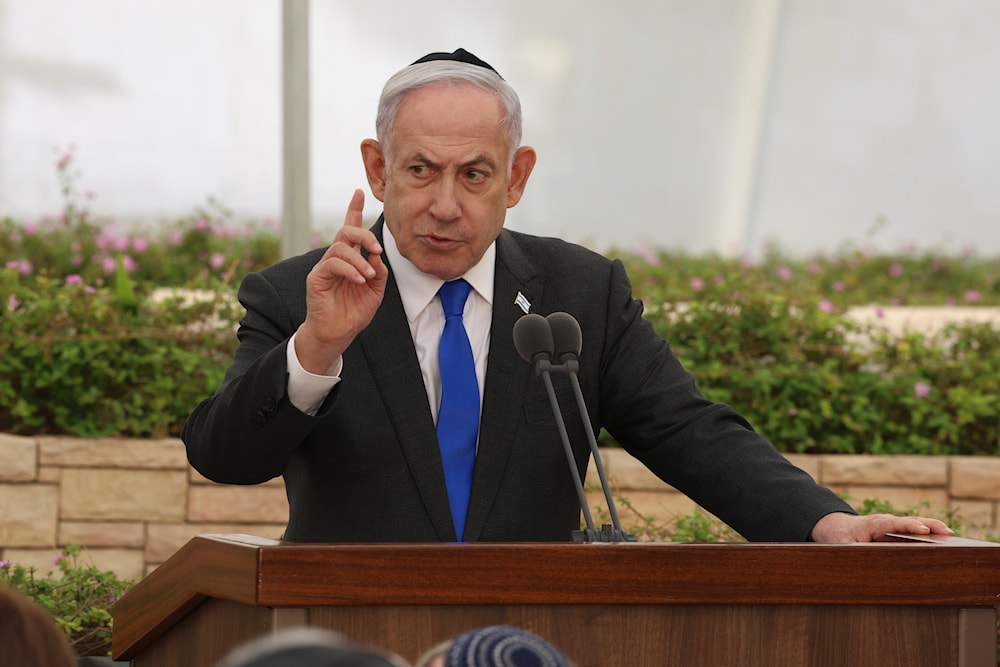Netanyahu's actions allegedly 'deepening rift with US', officials say
US officials say Netanyahu's actions with regards to the Biden administration are damaging US-Israeli relations and making matters worse with Lebanon.
-

Israeli Prime Minister Benjamin Netanyahu speaks during a ceremony at the Nahalat Yitzhak Cemetery in Tel Aviv, occupied Palestine, June 18, 2024. (AP)
Senior US officials have expressed concerns over Israeli Prime Minister Benjamin Netanyahu's actions, which they claim are straining the alliance between the Israeli occupation and the United States, Axios reported on Wednesday.
This tension, the officials warn, could erode the Israeli deterrence capabilities, especially in the eyes of Hezbollah leader Sayyed Hassan Nasrallah and Iran.
According to US officials, the latest discord between Netanyahu and the Biden administration is obstructing joint diplomatic efforts to mitigate tensions on the Lebanese border and prevent an all-out war.
Three Biden administration officials have voiced their concerns that Netanyahu's actions have been creating a rift between the two allies, thereby undermining the Israeli occupation's deterrence in the region, particularly from the perspective of Hezbollah and Iran.
"It is hard to fathom how a video like the one Netanyahu released on Tuesday helps with deterrence. There is nothing like telling Hezbollah that the US is withholding weapons from Israel, which is false, to make them feel emboldened," one official said, decrying Netanyahu's stunt.
Netanyahu unsatisfied
Speaking in English, Netanyahu claimed in the video that it was "inconceivable that in the past few months, the administration has been withholding weapons and ammunition from Israel."
Publicly, the White House expressed bafflement. Press Secretary Karine Jean-Pierre pointed out that only one weapons shipment had been paused since the war began, while billions of dollars worth of weapons had continued to flow unimpeded.
Privately, Biden's team has been furious and shocked by Netanyahu's ingratitude. Some US officials who viewed the video said Netanyahu appeared "disturbed."
The video was published while President Biden's envoy, Amos Hochstein, was traveling between occupied al-Quds and Beirut to ease tensions on the northern front. Hochstein was scheduled to meet Netanyahu on Tuesday evening to brief him on discussions with Lebanese officials and explore ways to avoid war.
According to three sources familiar with the matter, the meeting between Hochstein and Netanyahu was "tense." Hochstein and the US Ambassador to the Israeli occupation reportedly spent a significant portion of the meeting delivering a stern message to Netanyahu about the crisis he had provoked.
All US officials involved expressed confusion about Netanyahu's objectives, aside from scoring domestic political points. Some speculated that Netanyahu's remarks might be part of a credibility contest with Israeli Security Minister Yoav Gallant, who is expected to visit Washington next week.
Meetings canceled
The White House canceled a high-level meeting with "Israel" on Iran, scheduled for Thursday, after Israeli Prime Minister Benjamin Netanyahu released a video on Tuesday saying the US was withholding military aid, two US officials tell Axios.
According to two US and Israeli sources, President Biden's top advisors were infuriated by the video. US envoy Amos Hochstein conveyed this anger directly to Netanyahu during a meeting hours after the video's release. Subsequently, the White House escalated its response by canceling the meeting scheduled for Thursday.
"This decision makes it clear that there are consequences for pulling such stunts," a US official said, while a senior Israeli official said, "The Americans are fuming. Bibi's video made a lot of damage." It is worth noting that some Israeli officials were already en route to Washington when the meeting was canceled.
According to the Israeli official, National Security Advisor Jake Sullivan will still meet his Israeli counterpart, Tzachi Hanegbi, who has already departed for the US. Additionally, Israeli Security Minister Yoav Gallant is scheduled to visit early next week, Israeli officials say.
Relations between Biden and Netanyahu's administration are more strained now than at any point in the eight months since the war on Gaza began on October 7. This is the second time a meeting of the Iran strategic dialogue was canceled at the last minute.

 4 Min Read
4 Min Read








